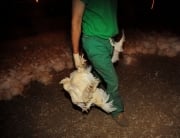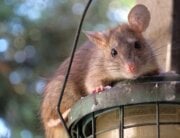Written by Craig D. Wescoe, a pastor at Creation Care Church. Follow the church on its website and social media at Facebook, YouTube, and Instagram.
During the recent Kind Hearted Campout in California, one of the speakers asked what motivated each camper to go vegan. Several said they went vegan for animals, others for the planet, and a few for their health. I raised my hand and said I was motivated by my faith.
Genesis 1:29 states very clearly that God designed us to eat plants. And as the story of Daniel, Hananiah, Mishael, and Azariah (found in Daniel 1) teaches us, there’s wisdom in following the diet God designed us for. These four young men refused to consume the animal flesh and wine being served to them by the king and instead opted for vegetables and water each day. As a result, they were found to be healthier and 10 times wiser than everyone around them.
In addition to being designed to eat an entirely plant-based diet, we have also been created in God’s image and likeness to reflect His character. Jesus says, “Be merciful, just as your Father is merciful” (Luke 6:36, NASB) and that our love should extend to all (Matthew 5:43–48). Jesus “did not come to be served, but to serve” (Mark 10:45, NKJV). Instead of seeing animals as existing to serve us, the proper perspective is that we were designed to serve our fellow creatures humbly, with Christ-like mercy and compassion.
I grew up being taught that animals were put here for us, but that isn’t what the Bible says. According to Psalm 24:1, everything belongs to God, including animals. And God cares about them. He even makes covenant promises to animals, just as He does to us (Genesis 9:16; Hosea 2:18). So if God values and loves animals enough to include them as members of His covenant family, that should motivate us to likewise see them as friends and fellow covenant recipients, not as mere commodities for fashion, entertainment, and palate pleasure.
Concern for animals is an essential part of my worship and devotion to the Lord. James 1:27 says that pure and undefiled religion involves caring for widows and orphans. In biblical times, widows and orphans were those who lacked a provider and were therefore representative of the most vulnerable. Thus, James is saying one’s religion is supposed to involve caring for the most vulnerable. Like widows and orphans, animals are also among the most vulnerable—especially those held on factory farms, caught in fur traps, and imprisoned in laboratory cages. Therefore, one’s religion should also include caring for animals, which is exactly what it says in Proverbs: “The righteous care for the needs of their animals, but the kindest acts of the wicked are cruel” (Proverbs 12:10, NIV).
One of my favorite heroes in the Bible is Balaam’s donkey. She repeatedly saves Balaam’s life, even though he beats her for it each time. After the third time, her mouth is opened and she says to him, “What have I done to you that deserves your beating me three times?” (Numbers 22:28, NLT). When I consider all the horrible ways we treat God’s creatures, I can hear the bellowing cries of mother cows whose calves are taken from them by the dairy industry, I can see wide-eyed piglets jumping off transport trucks to avoid slaughter, and I can feel the bleeding wounds of animals who are whipped so that they’ll perform at circuses and horse races. If all the animals of the world could collectively speak in one voice, I think they’d say exactly what Balaam’s donkey said to him: “What have I done to you that deserves this abuse?”






